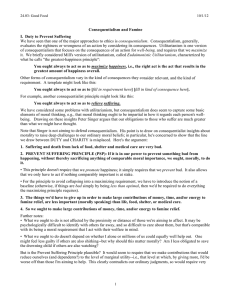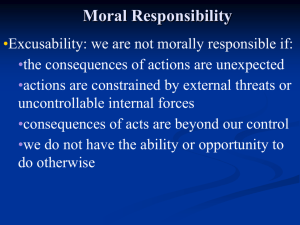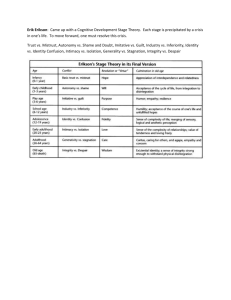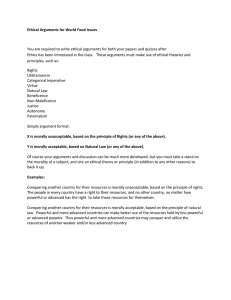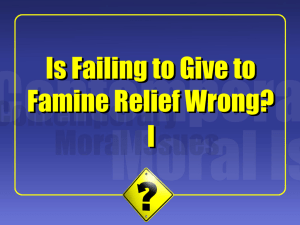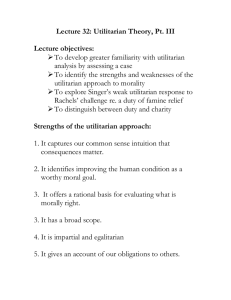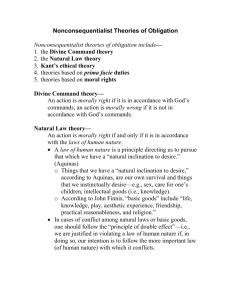24.02 Moral Problems and the Good Life MIT OpenCourseWare .
advertisement
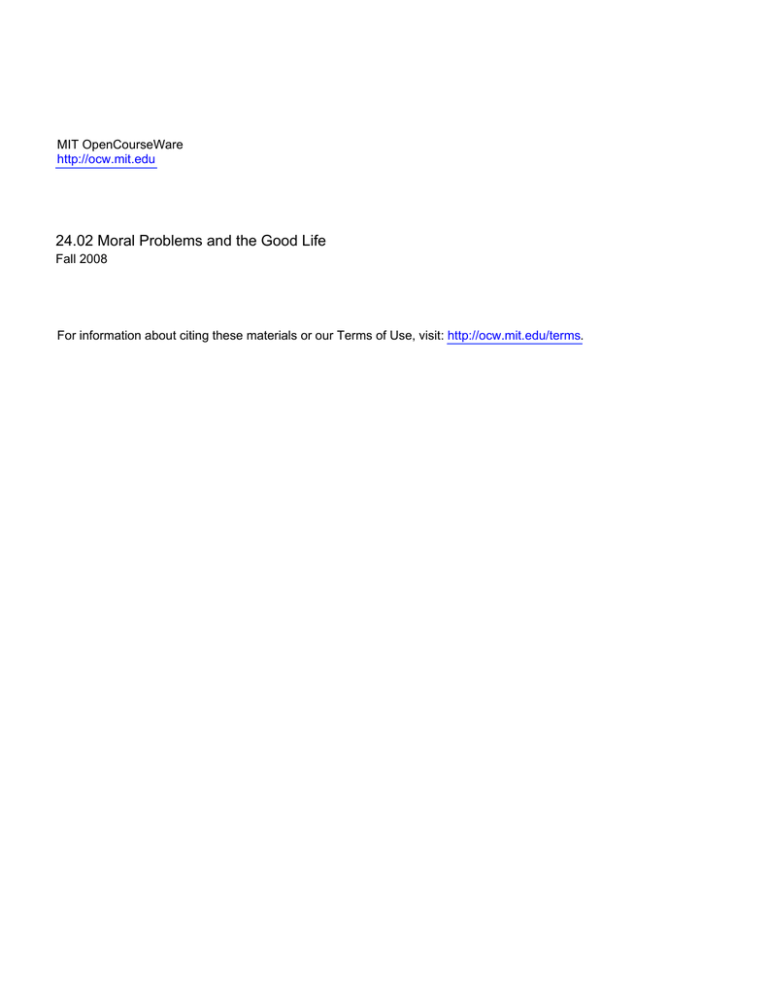
MIT OpenCourseWare http://ocw.mit.edu 24.02 Moral Problems and the Good Life Fall 2008 For information about citing these materials or our Terms of Use, visit: http://ocw.mit.edu/terms. Duty and Famine I. Duty to Prevent Suffering Last week we considered Mill's version of utilitarianism, called Eudaimonistic Utilitarianism, characterized by what he calls "the greatest-happiness principle": You ought always to act so as to maximize happiness, i.e., the right act is the act that results in the greatest amount of happiness overall. There are problems with utilitarianism, but it does seem to capture some basic elements of moral thinking, e.g., that moral thinking ought to be impartial in how it regards each person's well-being. Drawing on these insights Peter Singer argues that our obligations to those who suffer are much greater than what we might have thought. Note that Singer is not aiming to defend utilitarianism itself; the main principle he relies on requires less than full-blooded utilitarianism. His point is to show that there are compelling considerations that raise deep challenges to our ordinary moral beliefs; in particular, he's concerned to show that the line we draw between DUTY and CHARITY is misplaced. Here's the argument: 1. Suffering and death from lack of food, shelter and medical care are bad. 2. PREVENT SUFFERING PRINCIPLE (PSP): If it is in our power to prevent something bad from happening, without thereby sacrificing anything of comparable moral importance, we ought, morally, to do it. • This principle doesn't require that we promote happiness; it simply requires that we prevent bad. It also allows that we only have to act if nothing comparably important is at stake. • For the principle to avoid collapsing into utilitarianism, we have to introduce the notion of a baseline (otherwise, if things are bad simply by being less than optimal, then we'd be required to do everything the Utilitarian requires). 3. The things we'd have to give up in order to make large contributions of money, time, and/or energy to famine relief, are less important (morally speaking) than life, food, shelter, or medical care. 4. So we ought to make large contributions of money, time, and/or energy to famine relief. Further notes: • What we ought to do is not affected by the proximity or distance of those we're aiming to affect. It may be psychologically difficult to identify with others far away, and so difficult to care about them, but that's compatible with its being a moral requirement that I act with their welfare in mind. • What we ought to do doesn't depend on whether I alone or millions of us could equally well help out. One might feel less guilty if others are also shirking--but why should this matter morally? Am I less obligated to save the drowning child if others are also watching? But is the Prevent Suffering Principle plausible? It would seem to require that we make contributions that would reduce ourselves (and dependents?) to the level of marginal utility--i.e., that level at which, by giving more, I'd be worse off than those I'm aiming to help. This clearly contradicts our ordinary judgments, so would require very strong backing--which Singer doesn't try to offer. Instead he suggests a weaker principle that seems extremely plausible. Here are the revised premises: 2*. MODIFIED PREVENT SUFFERING PRINCPLE (MPSP: weaker/moderate version): If it is our power to prevent something very bad from happening, without thereby sacrificing anything morally significant, then we ought, morally, to do it. 1 • example: saving a drowning child only at the cost of getting one's clothes muddy. 3*. The things we'd have to give up in order to make large contributions of money, time, and/or energy to famine relief, are not morally significant. 4 (same as before). So we ought to make large contributions of money, time, and/or energy to famine relief. II. Duty and Charity The move from the strong to the weak version helps, but it puts added pressure on premise (3*)--are the sacrifices we'd have to make morally insignificant? We tend to distinguish DUTY from CHARITYwhat we give to relief organizations here or abroad is morally optional--we're good to do it, but we don't really have to. What (3*) suggests is that many of the things we do with our money, time, and energy, are morally insignificant. If we recognized that aid and assistance to relieve suffering is not morally optional, then our lives would look very different. Singer acknowledges that these demands are out of line with our ordinary judgments, but thinks it doesn't matter--what matters is what's right not what we ordinarily think. But why should we think that our "luxuries" aren't morally significant? If happiness is morally significant, and they bring us happiness, why aren't they morally significant? What marks the line between the morally significant and the morally insignificant? Singer seems to think that the only thing that matters morally is suffering and relief from it--as long as you've reached the baseline for a reasonable life, anything more is morally irrelevant. But this is implausible--(and note--strongly anti-utilitarian); a life for everyone at the baseline might be a pretty gloomy existence. Is that what we should be aiming for? Singer could respond--look at the alternative: some people suffer and die when they could be helped, while others luxuriate in their riches? Is this a morally acceptable situation? III. Lifeboat Ethics Garrett Hardin argues for the claim that not only do we have no moral obligation to give relief aid to poor countries, but we are morally obliged not to provide aid. He relies on an analogy with a lifeboat. Do those on a lifeboat have an obligation to bring aboard all others who are drowning? Hardin says “No.” The right action is to bring aboard only that number compatible with the safety of those on board, for any other action would be to bring about, or at least risk, disaster. He then argues that we shouldn’t help feed the starving in poor countries because given the patterns of population growth and limitations on resources, like overloading the lifeboat, this will only result in worse consequences down the road. Objections: 1) Are we currently in a lifeboat situation? Are rich countries at their “carrying capacity”? 2) Does it matter if the lifeboat (wealth) was obtained unjustly or immorally? 3) Is population growth in poor countries the primary cause of famine? Who is responsible for the famine? If we are responsible for inequity in the distribution of resources, should they suffer for it? 4) Is it plausible that aid to poor countries causes population growth? How does adequate food, education and health care affect population growth? 5) Is it really better to avoid the risk of a slightly worse disaster by allowing a certain disaster? 6) Suppose we grant that in the future more will die of starvation if we give to famine relief now than will die if we withhold aid. But what are we to make of all the additional years lived and people born between now and then? Many lives will be lost, but many will also be gained. How would Hardin respond? 2

